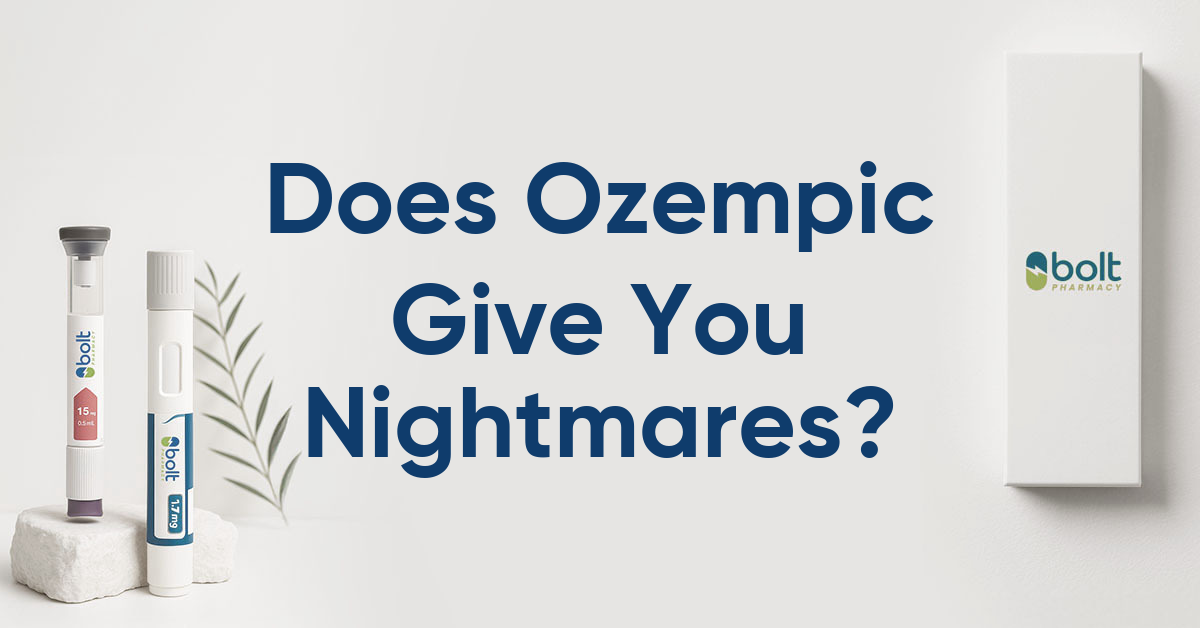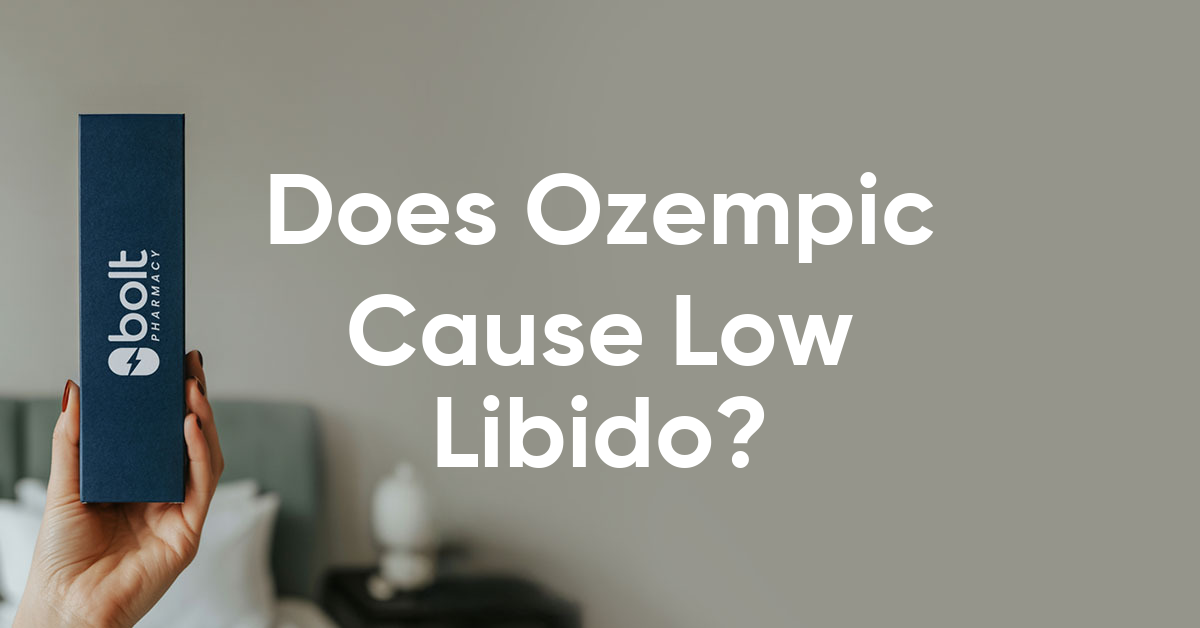Does Ozempic give you nightmares? Ozempic (semaglutide) is a glucagon-like peptide-1 (GLP-1) receptor agonist licensed in the UK for type 2 diabetes management. Whilst nightmares and vivid dreams are not listed as recognised adverse effects in the Summary of Product Characteristics (SmPC) or MHRA guidance, some patients have reported sleep disturbances during treatment. This article examines the evidence, explores potential contributing factors, and provides practical advice for anyone experiencing unusual dreams whilst taking Ozempic. Always discuss any concerning symptoms with your GP or diabetes specialist nurse.
Summary: Nightmares are not listed as a recognised side effect of Ozempic (semaglutide) in UK regulatory guidance or clinical trial data.
- Ozempic is a GLP-1 receptor agonist licensed for type 2 diabetes treatment in the UK.
- The MHRA and SmPC do not include nightmares or vivid dreams amongst documented adverse effects.
- Common side effects include gastrointestinal symptoms such as nausea, vomiting, diarrhoea, and constipation.
- Sleep disturbances may relate to weight loss, dietary changes, blood glucose fluctuations, or concomitant medications.
- Report persistent or distressing nightmares to your GP or diabetes specialist nurse for assessment.
- Suspected adverse reactions should be reported to the MHRA via the Yellow Card Scheme.
Table of Contents
Does Ozempic Cause Nightmares or Vivid Dreams?
Ozempic (semaglutide) is a glucagon-like peptide-1 (GLP-1) receptor agonist licensed in the UK for the treatment of type 2 diabetes mellitus. A different semaglutide formulation, Wegovy (semaglutide 2.4 mg), is licensed for weight management. According to the Medicines and Healthcare products Regulatory Agency (MHRA) and the Summary of Product Characteristics (SmPC), nightmares or vivid dreams are not listed as recognised adverse effects of Ozempic, though anecdotal reports from patients have raised questions about potential sleep disturbances during treatment.
Currently, there is no official link established between semaglutide and nightmares in clinical trial data or post-marketing surveillance as documented in the Ozempic SmPC and European Medicines Agency (EMA) assessment reports. The most commonly reported side effects of Ozempic include gastrointestinal symptoms such as nausea, vomiting, diarrhoea, and constipation, which affect a significant proportion of users, particularly during dose escalation. However, the absence of nightmares from formal adverse event profiles does not entirely exclude the possibility of individual experiences, as sleep disturbances can be multifactorial.
It is important to consider that patients starting Ozempic may be experiencing other changes—such as dietary modifications, weight loss, improved glycaemic control, or psychological adjustments—that could independently influence sleep quality and dream patterns. Additionally, some individuals may be taking concomitant medications that affect sleep architecture. If you are experiencing nightmares or unusual dreams whilst taking Ozempic, it is advisable to discuss this with your GP or diabetes specialist nurse to explore potential contributing factors and determine whether any intervention is necessary. Suspected adverse reactions can be reported to the MHRA via the Yellow Card Scheme.

Reported Sleep-Related Side Effects of Ozempic
The formal adverse event profile of Ozempic, as documented by the MHRA and European Medicines Agency (EMA), does not include nightmares or vivid dreams amongst its listed side effects. Clinical trials evaluating semaglutide have primarily focused on glycaemic control, cardiovascular outcomes, and weight reduction, with adverse event monitoring centred on gastrointestinal tolerability, hypoglycaemia risk, and complications such as pancreatitis or diabetic retinopathy progression.
Despite the lack of formal recognition, patient forums and anecdotal reports have occasionally mentioned changes in sleep patterns, including vivid dreams or nightmares, particularly during the initial weeks of treatment or following dose increases. These reports remain unvalidated by large-scale studies and may reflect a range of confounding factors rather than a direct pharmacological effect of semaglutide.
It is worth noting that while Ozempic does not list sleep disturbances, some other GLP-1 receptor agonists do have recognised sleep effects. For example, both Saxenda (liraglutide) and Wegovy (semaglutide 2.4 mg) list insomnia as a potential side effect in their SmPCs. Metabolic changes, weight loss, and improved insulin sensitivity can potentially alter sleep architecture and may contribute to changes in dream recall or intensity.
Common side effects of Ozempic that are well-documented in the SmPC include:
-
Gastrointestinal symptoms: nausea (very common), vomiting, diarrhoea, abdominal pain, and constipation
-
Hypoglycaemia: particularly when used in combination with insulin or sulfonylureas
-
Injection site reactions: mild and usually transient
-
Fatigue: reported in some patients
If you experience severe, persistent abdominal pain (with or without vomiting), seek urgent medical attention as this could indicate pancreatitis, a rare but serious side effect requiring immediate assessment. If sleep disturbances are troubling, it is worth reviewing all medications and lifestyle factors with your healthcare provider.
What to Do If You Experience Nightmares on Ozempic
If you are experiencing nightmares, vivid dreams, or other sleep disturbances whilst taking Ozempic, it is important to approach the situation systematically and in consultation with your healthcare team. Do not discontinue or alter your medication without medical advice, as abrupt cessation may affect your diabetes control.
Initial steps to consider include:
-
Keep a sleep diary: Document the frequency, intensity, and timing of nightmares, along with any other symptoms such as nausea, changes in appetite, or mood alterations. This information will help your GP assess whether there is a temporal relationship with Ozempic initiation or dose changes.
-
Review concomitant medications: Some drugs, including certain antidepressants, beta-blockers, and medications for Parkinson's disease, are known to affect sleep and dreaming. Discuss your full medication list with your healthcare provider.
-
Assess lifestyle factors: Consider recent changes in diet, exercise, caffeine or alcohol intake, stress levels, and sleep hygiene practices, all of which can influence sleep quality.
-
Monitor blood glucose levels: Nocturnal hypoglycaemia or hyperglycaemia can disrupt sleep and may contribute to unusual dreams or night-time awakenings. If you suspect night-time hypoglycaemia, check your glucose levels when you wake from nightmares. If hypoglycaemia is confirmed, treat according to your healthcare team's advice (typically with 15-20g of fast-acting carbohydrate) and discuss this with your diabetes team.
When to seek medical advice:
You should contact your GP or diabetes specialist nurse if nightmares are persistent, distressing, or accompanied by other concerning symptoms such as severe mood changes, anxiety, or depression. Seek urgent help via NHS 111, crisis services, or 999/A&E if you experience thoughts of self-harm or suicide. While no causal link has been established between GLP-1 receptor agonists and suicidal thoughts, any such symptoms require immediate attention.
Your healthcare provider may consider adjusting your Ozempic dose, reviewing your overall treatment regimen, or referring you for further assessment if sleep disturbances are significantly impacting your quality of life.
In accordance with NICE guidance on type 2 diabetes management (NG28), individualised treatment plans should balance efficacy with tolerability, and any adverse effects should be taken seriously and managed appropriately. Remember to report suspected side effects to the MHRA through the Yellow Card Scheme.
How Ozempic Works and Its Effects on Sleep
Understanding the mechanism of action of Ozempic can provide insight into whether there is a plausible biological basis for sleep-related effects. Semaglutide is a long-acting GLP-1 receptor agonist that mimics the action of endogenous glucagon-like peptide-1, an incretin hormone released from the gut in response to food intake. Its primary therapeutic effects include:
-
Enhanced glucose-dependent insulin secretion: Semaglutide stimulates pancreatic beta cells to release insulin when blood glucose levels are elevated, thereby improving glycaemic control without significantly increasing hypoglycaemia risk.
-
Suppression of glucagon secretion: This reduces hepatic glucose output, particularly in the postprandial state.
-
Delayed gastric emptying: Semaglutide slows the rate at which food leaves the stomach, contributing to improved post-meal glucose excursions and promoting satiety.
-
Central appetite regulation: GLP-1 receptors are present in the hypothalamus and other brain regions involved in appetite control, leading to reduced caloric intake and weight loss.
Whilst GLP-1 receptors are found in the central nervous system, there is currently no established mechanism by which semaglutide would directly alter sleep architecture or dream content. The extent to which semaglutide crosses the blood-brain barrier remains under study, with central effects potentially mediated through peripheral GLP-1 receptors and vagal afferent pathways.
However, indirect effects on sleep may occur through several pathways. Weight loss can positively influence sleep quality, particularly in individuals with obesity-related sleep apnoea. If you have symptoms such as loud snoring, witnessed breathing pauses during sleep, or persistent daytime sleepiness, discuss assessment for sleep apnoea with your healthcare provider. Conversely, gastrointestinal side effects such as nausea or abdominal discomfort may disrupt sleep, particularly if symptoms are prominent at night. Additionally, changes in eating patterns, meal timing, and blood glucose stability may all influence sleep-wake cycles and dream recall.
Patient safety advice: If you experience any unexpected or troubling symptoms whilst taking Ozempic, including sleep disturbances, discuss them with your healthcare provider. Maintaining open communication ensures that your treatment remains both effective and tolerable, supporting long-term adherence and optimal health outcomes.
Frequently Asked Questions
Are nightmares a recognised side effect of Ozempic?
No, nightmares are not listed as a recognised adverse effect in the Ozempic Summary of Product Characteristics or MHRA guidance. If you experience nightmares whilst taking Ozempic, discuss this with your GP to explore potential contributing factors.
What are the most common side effects of Ozempic?
The most common side effects of Ozempic include gastrointestinal symptoms such as nausea, vomiting, diarrhoea, abdominal pain, and constipation, particularly during dose escalation. Hypoglycaemia may occur when used with insulin or sulfonylureas.
What should I do if I experience sleep disturbances on Ozempic?
Keep a sleep diary, review all medications with your GP, assess lifestyle factors, and monitor blood glucose levels for nocturnal fluctuations. Do not stop Ozempic without medical advice, and report persistent symptoms to your healthcare provider.
The health-related content published on this site is based on credible scientific sources and is periodically reviewed to ensure accuracy and relevance. Although we aim to reflect the most current medical knowledge, the material is meant for general education and awareness only.
The information on this site is not a substitute for professional medical advice. For any health concerns, please speak with a qualified medical professional. By using this information, you acknowledge responsibility for any decisions made and understand we are not liable for any consequences that may result.
Heading 1
Heading 2
Heading 3
Heading 4
Heading 5
Heading 6
Lorem ipsum dolor sit amet, consectetur adipiscing elit, sed do eiusmod tempor incididunt ut labore et dolore magna aliqua. Ut enim ad minim veniam, quis nostrud exercitation ullamco laboris nisi ut aliquip ex ea commodo consequat. Duis aute irure dolor in reprehenderit in voluptate velit esse cillum dolore eu fugiat nulla pariatur.
Block quote
Ordered list
- Item 1
- Item 2
- Item 3
Unordered list
- Item A
- Item B
- Item C
Bold text
Emphasis
Superscript
Subscript












